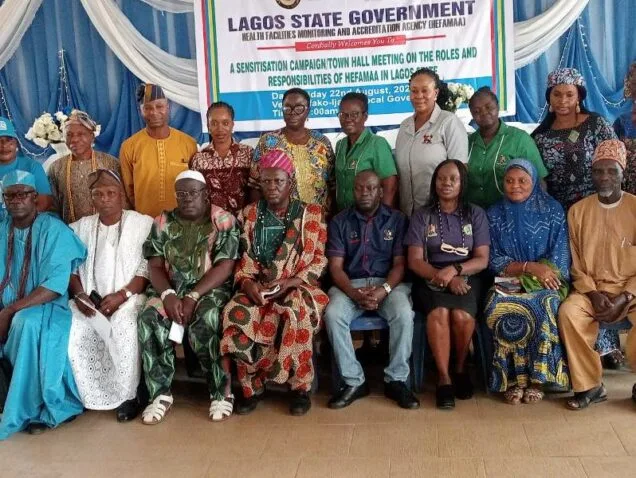The Lagos State Health Facilities Monitoring and Accreditation Agency (HEFAMAA) has announced the closure of 30 health facilities across the state for operating illegally or failing to meet the government’s minimum required standards.
The disclosure was made on Friday during a sensitisation town hall meeting held at the Ifako-Ijaiye Local Government Secretariat.
Speaking at the event, the agency’s Permanent Secretary, Dr. Abiola Idowu, represented by the Director of Monitoring and Inspection, Dr. Daniel Olayinka, said the closures are part of ongoing efforts to rid Lagos of quack medical practitioners and substandard health institutions.
According to her, many of the sealed facilities were either unregistered or lacked qualified personnel. Inspections revealed unhygienic environments, faulty or outdated medical equipment, and, in some cases, a complete absence of trained staff. Operators of several facilities also failed to provide valid professional licences or credentials when requested.
“Our mandate is to protect residents from unsafe healthcare practices,” Idowu said. “Most of the facilities shut down were not registered with the Lagos State Government. Others did not have qualified personnel on site. Some operators couldn’t present valid professional licences, and we found issues such as poor sanitary conditions and malfunctioning equipment.”
She stressed that HEFAMAA’s role is not punitive but regulatory, aimed at ensuring the delivery of safe and quality healthcare services to the public.
“We’re not a law enforcement agency, but our job is to ensure compliance with healthcare standards,” she noted. “If what a facility declared at the time of registration is no longer valid—be it in staffing, equipment, or hygiene—we intervene. Ultimately, HEFAMAA exists to protect lives.”
Dr. Idowu urged residents to verify the legitimacy of healthcare facilities by checking for the agency’s signage and ensuring that the facility’s certificate of registration is clearly displayed at reception areas.
She also introduced a new verification tool using QR codes, which are now being placed in licensed health facilities. By scanning the codes, patients can access essential details about the facility—such as name, ownership, address, and accredited services—and provide feedback directly to HEFAMAA.
“This initiative allows us to respond promptly to patient complaints,” she said. “Whether you are satisfied or dissatisfied with the care received, your feedback goes straight to us. It enhances our monitoring efforts.”
Idowu warned the public about the dangers of patronising unregistered health facilities, noting that such centres—often disguised as hospitals, maternity homes, or laboratories—are typically operated by unqualified individuals. She explained that these operators often disappear when complications arise, leaving patients with no legal recourse.
“Quackery is dangerous. If anything goes wrong in an unregistered facility, it’s difficult for the government to trace or sanction the culprits. Some simply vanish overnight and reopen elsewhere. That’s why we urge residents to seek care only from facilities certified by HEFAMAA,” she warned.
She also commended the collaboration of traditional rulers and local government stakeholders in the campaign against quackery, noting that community participation is essential in combating unregulated healthcare services.
“Everyone is a potential patient. That’s why the Lagos State Government is committed to patient safety,” Idowu added. “But we need residents to play their part—by identifying safe facilities and reporting suspicious ones.”
HEFAMAA, she assured, will continue to intensify its oversight of both public and private health institutions to ensure they maintain proper standards in personnel, equipment, and hygiene.


